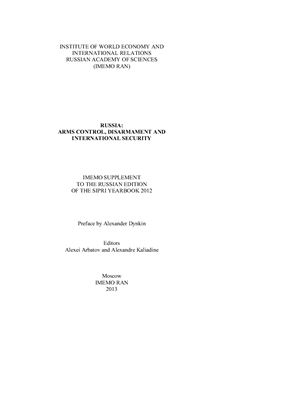Moscow: IMEMO RAN, 2013. – 200 p.
13-й выпуск сборника «Россия: контроль над вооружениями,
разоружение и международная безопасность» представляет собой
англоязычную версию ежегодного аналитического обзора ИМЭМО –
специального приложения к русскому изданию Ежегодника СИПРИ 2012:
вооружения, разоружение и международная безопасность.
В сборник включены исследования по проблеме перехода к многостороннему ядерному разоружению, в том числе по вопросам подключения Китая, Индии, Пакистана и других государств, имеющих ядерное оружие, к процессу ограничения ядерных вооружений. Рассмотрен также ряд других проблем международной безопасности, нераспространения, контроля над вооружениями и разоружения: влияние систем ПРО на стратегическую стабильность; ограничение международной торговли легким и стрелковым оружием; контроль над обычными вооружениями в Европе: выход из тупика; особенности военного строительства в постсоветских центральноазиатских государствах в контексте вызовов региональной безопасности. The volume provides IMEMO contributions to the Russian edition of the 2012 SIPRI Yearbook: Armaments, Disarmament and Inteational Security. The contributors address issues involving
transition to multilateral nuclear disarmament (engaging ‘third’ nuclear weapons states in nuclear arms negotiations; frameworks of multilateral nuclear disarmament; a possible basis of practical
negotiations; BMD developments and their implications for strategic stability).
This year’s edition also highlights problems of limiting inteational trade in small arms and light weapons; the status of the European conventional arms control regime and ways leading to
meaningful conventional arms limitation arrangements in Europe; military posture of post-Soviet Central Asian states and regional security challenges. Transition to multilateral nuclear disarmament: issues and options. Abstracts
Alexei Arbatov
Nuclear disarmament negotiations require a powerful initiating momentum
Alexandre Kaliadine
Multilateral nuclear arms regulation in terms of ‘game theory’
Sergey Afontsev
Robust interdisciplinary research is required
Alexander Radchuk
Complex and controversial task
Vladimir Baranovsky Аsia-Pacific region (Japan, Republic of Korea, Australia, Taiwan)
Middle East (Israel) Petr Topychkanov
Political reasons of the nuclear choice of South Asian competitors
Development of missile programs in South Asia
Status and prospects for the development of nuclear arsenals of India and Pakistan
Uncertainty of the nuclear doctrines of India and Pakistan
Problems of arms control in South Asia
Conclusions Small arms, big problems
Natalia Kalinina
The conflict potential of SALW
Global trade in SALW
Inteational reporting on SALW
Work done to curb SALW proliferation: timeline
UN Programme of Action on SALW and its history
Conclusion Contemporary problems of nuclear non-proliferation. The fifth anniversary
conference of the inteational Luxembourg forum on preventing nuclear catastrophe
Vladimir Yevseev
Russian experts on engaging China in multilateral nuclear arms control negotiations
Tatiana Anichkina Prospects of engaging India and Pakistan in nuclear arms limitations. Review of the
conference at IMEMO.
Dmitry Chizhov Conventional arms control in europe:
is there a way out of the stalemate?
Andrei Zagorski
Attempts to revitalize the Cfe regime
Prospects for a new agreement
Parameters of a possible new agreement Military posture of Post-Soviet Central Asian states and regional security challenges
Stanislaw Ivanov Key documents of the russian federation on national security, defence and arms control
(january-december 2012)
Tamara Faasova
Legislative acts
Normative acts Declaration of the fifth anniversary conference of the inteational Luxembourg
Forum on Preventing Nuclear Catastrophe. Contemporary problems of nuclear non-proliferation (4-5 june 2012, Berlin)
About the contributors
В сборник включены исследования по проблеме перехода к многостороннему ядерному разоружению, в том числе по вопросам подключения Китая, Индии, Пакистана и других государств, имеющих ядерное оружие, к процессу ограничения ядерных вооружений. Рассмотрен также ряд других проблем международной безопасности, нераспространения, контроля над вооружениями и разоружения: влияние систем ПРО на стратегическую стабильность; ограничение международной торговли легким и стрелковым оружием; контроль над обычными вооружениями в Европе: выход из тупика; особенности военного строительства в постсоветских центральноазиатских государствах в контексте вызовов региональной безопасности. The volume provides IMEMO contributions to the Russian edition of the 2012 SIPRI Yearbook: Armaments, Disarmament and Inteational Security. The contributors address issues involving
transition to multilateral nuclear disarmament (engaging ‘third’ nuclear weapons states in nuclear arms negotiations; frameworks of multilateral nuclear disarmament; a possible basis of practical
negotiations; BMD developments and their implications for strategic stability).
This year’s edition also highlights problems of limiting inteational trade in small arms and light weapons; the status of the European conventional arms control regime and ways leading to
meaningful conventional arms limitation arrangements in Europe; military posture of post-Soviet Central Asian states and regional security challenges. Transition to multilateral nuclear disarmament: issues and options. Abstracts
Alexei Arbatov
Nuclear disarmament negotiations require a powerful initiating momentum
Alexandre Kaliadine
Multilateral nuclear arms regulation in terms of ‘game theory’
Sergey Afontsev
Robust interdisciplinary research is required
Alexander Radchuk
Complex and controversial task
Vladimir Baranovsky Аsia-Pacific region (Japan, Republic of Korea, Australia, Taiwan)
Middle East (Israel) Petr Topychkanov
Political reasons of the nuclear choice of South Asian competitors
Development of missile programs in South Asia
Status and prospects for the development of nuclear arsenals of India and Pakistan
Uncertainty of the nuclear doctrines of India and Pakistan
Problems of arms control in South Asia
Conclusions Small arms, big problems
Natalia Kalinina
The conflict potential of SALW
Global trade in SALW
Inteational reporting on SALW
Work done to curb SALW proliferation: timeline
UN Programme of Action on SALW and its history
Conclusion Contemporary problems of nuclear non-proliferation. The fifth anniversary
conference of the inteational Luxembourg forum on preventing nuclear catastrophe
Vladimir Yevseev
Russian experts on engaging China in multilateral nuclear arms control negotiations
Tatiana Anichkina Prospects of engaging India and Pakistan in nuclear arms limitations. Review of the
conference at IMEMO.
Dmitry Chizhov Conventional arms control in europe:
is there a way out of the stalemate?
Andrei Zagorski
Attempts to revitalize the Cfe regime
Prospects for a new agreement
Parameters of a possible new agreement Military posture of Post-Soviet Central Asian states and regional security challenges
Stanislaw Ivanov Key documents of the russian federation on national security, defence and arms control
(january-december 2012)
Tamara Faasova
Legislative acts
Normative acts Declaration of the fifth anniversary conference of the inteational Luxembourg
Forum on Preventing Nuclear Catastrophe. Contemporary problems of nuclear non-proliferation (4-5 june 2012, Berlin)
About the contributors

